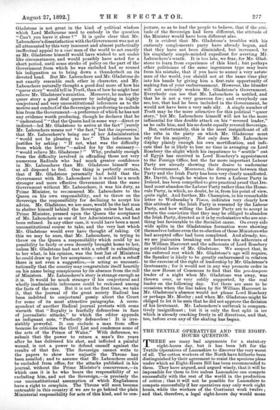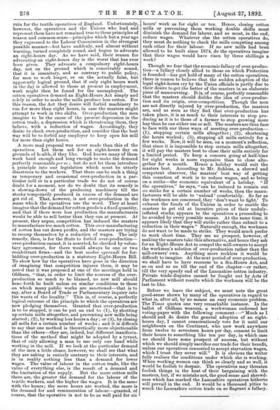THE TEXTILE OPERATIVES AND THE EIGHT HOURS QUESTION.
THERE are many bad arguments for a statutory eight-hours day, but it has been left for the Textile Operatives of Lancashire to discover the very worst of all. The cotton workers of the North have hitherto been distinguished by their agreement to resist the specious pleas under which an Eight-Hours Bill has been recommended to them. They have argued, and argued wisely, that it will be impossible for them to live unless Lancashire can compete successfully with the rest of the world in the production of cotton ; that it will not be possible for Lancashire to compete successfully if her operatives may only work eight hours, while the workers of the Continent work twelve ; and that, therefore, a legal eight-hours day would mean ruin for the textile operatives of England. Unfortunately, however, the operatives and the Unions who lead and represent them have not remained true to these principles of reason and common-sense--principles which but a year ago they expressed to the Labour Commission in the strongest possible manner—but have suddenly, and almost without warning, turned completely round, and begun to advocate an eight-hours day. As we have said, their reason for advocating-an eight-hours day is the worst that has ever been given. They advocate a compulsory eight-hours day, not on the ground which is conceivably sound, that it is insanitary, and so contrary to public policy, for men to work longer, or on the actually false, but apparently logical ground, that if only eight hours work in the day is allowed to those at present in employment, work might then be found for the unemployed. The cotton operatives demand an Eight-Hours Act simply and solely in order to make the mills produce less cotton. For this reason, the Act they desire will forbid machinery to run for more than eight hours, in case the masters might attempt to work in two shifts. Over-production the men imagine to be the cause of the present depression in the cotton trade, a depression which is threatening them, they believe, with a reduction of wages. Accordingly, they desire to check over-production, and consider that the best way will be to forbid any employer to keep open his mill for more than eight hours.
A. more mad proposal was never made than this of the operatives. Let them ask for an eight-hours day on grounds of health, if they like. God knows many of them work hard enough and long enough to make the demand perfectly rea,sonableper 8e; but do not let them introduce a principle into our legislation which must be utterly disastrous to the workers. That there can be such a thing as temporary and occasional over-production in a par- ticuJar mill or in a particular trade we do not of course doobt for a moment, nor do we doubt that its remedy is a slowing-down of the producing machinery till the stocks temporarily produced in excess of the demand are got rid of. That, however, is not over-production in the sense which the operatives use the word. They at heart imagine that the demand for cotton goods is a fixed quantity, and.that if there were less production the manufacturers would be able to sell better than they can at present. At present, they argue, competition has induced the masters to manufacture too much cotton. This over-manufacturing of ,cotton has cut down profits, and the masters are trying to recoup themselves by a reduction of wages. The only remedy, then, is for the State to forbid over-production- over-production cannot, it is asserted, be checked by volun- tary agreement, for there would always be one or two recalcitrant firms—and the best modus operandi for for- bidding over-production is a statutory Eight-Hours Bill. To show how far the operatives have gone in the direction of. imagining that competition injures them, it may be noted that it was proposed at one of the meetings held in Oldham, "that, in order to limit the sources of the over- production so much to be blamed, no new mill should hens-forth be built unless on similar conditions to those on which many public works are sanctioned—that is to say, after a Board of Trade or Parliamentary inquiry into the wants of the locality." This is, of course, a perfectly logical outcome of the principle to which the operatives are now pledging themselves. Granted that over-production is to be stopped, it can be put an end to (1), by shutting up certain mills altogether, and preventing new mills being started ; (2), by working less hours a day ; or (3), by closing all mills for a certain number of weeks ; and it is difficult to say that one method is theoretically more objectionable than the others—they are, indeed, but different manifesta- tions of the method that might be adopted by a tyrant, that of only allowing a man to use only one hand while working in the mill. If we look at the particular demand of the men a little closer, however, we shall see that what they are asking is entirely contrary to their interests, and• is in reality nothing less than a demand for lower• wages. The value of labour in the cotton trade, like the value of everything else, is the result of a demand and the limitation of the supply. But the more cotton mills there are, the greater the demand for the labour of the textile workers, and the higher the wages. It is the same with the hours ; the more hours are worked, the more is the demand for and remuneration of labour—granted, of course, that the operative is not to be as well paid for six hours' work as for eight or ten. Hence, closing cotton mills or preventing them working double shifts must diminish the demand for labour, and so must, in the end, reduce wages. Whatever else the cotton operatives do, they must do nothing to check the mills competing among each other for their labour. If no new mills had been allowed to be built since 1874, do the operatives imagine that their wages would have risen by three shillings a week P Though we fear that the economic fallacy of over-produc- tion—a fallacy closely allied to those on which Protection is founded—has got hold of many of the cotton operatives, there is reason to believe that the sudden adoption of the legal eight-hours cry by the Union officials is partly due to their desire to get the better of the masters in an elaborate piece of manceuvring. It is, of course, perfectly reasonable that the masters should dislike the idea of over-produc- tion and its origin, over-competition. Though the men are not directly injured by over-production, the masters are, and as soon as they find that over-production has taken place, it is as much to their interests to stop pro- ducing as it is to those of a farmer to stop growing more hay than he can either use or sell. The masters are thus face to face with our three ways of meeting over-production- (1), stopping certain mills altogether ; (2), shortening the hours worked ; (3), stopping all mills entirely for a few weeks. Now, it will be seen, on a moment's reflection, that since it is impossible to stop certain mills altogether, it will pay the masters best to close.their mills entirely for a limited period. To keep a concern going at half-time for eight weeks is more expensive than to close alto- gether for a month. Hence a holiday would suit the masters best. According to Mr. Schloss, a shrewd and competent observer, the masters' best way of getting this cessation of work is to reduce wages, and so bring on a strike—the economic equivalent of a holiday. "If the operatives," he says, "can be induced to remain out on strike for a certain number of weeks, then the manu- facturers will be able to 'unload' comfortably. So far as the workmen are concerned, they don't want to fight.' To exhaust the funds of the Unions in order to enable the masters to get rid at lucrative prices of their unduly- inflated stocks, appears to the operatives a proceeding to be avoided by every possible means. At the same time, it appears likely that they will strike rather than submit to a reduction in their wages." Naturally enough, the workmen do not want to be made to strike. They would much prefer to work short time. They see no prospect, however, of making the masters take this alternative, and hence they ask for an Eight-Hours Act to compel the mill-owners to accept the workmen's solution of over-production rather than the mill-owners' own. Anything more reckless it would be difficult to imagine. At the next period of over-production, we shall have to have recourse to a Six-Hours Act, and so on and so on till the end of the chapter—or rather, till the very speedy end of the Lancashire cotton industry. Private trade-disputes cannot be fought out by Acts of Parliament without results which the workmen will be the last to like.
Before we leave the subject, we must note the great good-sense shown by many of the operatives in regard to what is, after all, by no means an easy economic problem. The Times quotes one very remarkable instance. In the ballot of Oldham weavers, a workwoman endorsed her voting-paper with the following comment :—" Much as I should and do desire the general adoption of an eight- hours day, I cannot conscientiously vote for it until our neighbours on the Continent, who now work anywhere from twelve to seventeen hours per day, consent to limit their hours to something like ten per day, in which case we should have some prospect of success, but without which we should simply sacrifice our trade for their benefit, unless our operatives consented to accept starvation wages, which I trust they never will." It is obvious the writer fully realises the conditions under which she is working. When working women can think so clearly and so well, it would be foolish to despair. The operatives may threaten foolish things in the heat of their bargaining with the masters, but, if we mistake not, the good sense and shrewd- ness which has marked the Lancashire operatives hitherto will prevail in the end. It would be a thousand pities to wreck the Lancashire cotton trade on so flagrant a fallacy.



































 Previous page
Previous page